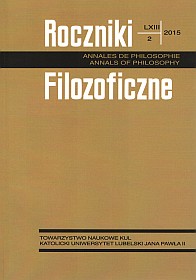Mystical Interpretation of the Exile and Return to Paradise in Eriugena’s Periphyseon
Abstract
Over the recent years we have welcomed a number of significant publications (in particular the contributions by Peter T. Struck and Mikołaj Domaradzki) highlighting the importance of allegory and allegorical interpretation in ancient literary culture. The allegorical approach to literary text identifies the literary work as a puzzle, the solving of which introduces the reader to a profounder kind of knowledge, a knowledge that is hidden from the eyes of the “uninitiated.” This kind of interpretation implies a special understanding of the function of language, which “by revealing— conceals”. Allegorical interpretation assumed paramount importance in Neoplatonism, the philosophy which attributed religious functions to the philosophical endeavor of man (such functions as assimilation to God and return to man’s (spiritual) fatherland). The most salient features of the Neoplatonic allegorism have been presented by Peter T. Stuck in his article Allegory and ascent in Neoplatonism complete with the account of the role attributed to allegory as a guide along the path leading to mystical union.
In this article attention has been focused upon those elements of the Neoplatonic allegorical exegesis, which may be of use in exploring the specifics of Eriugena’s interpretation of the themes of the exile from and return to the paradise.
References
Carabine, Deirde. The Unknown God: Negative Theology in the Platonic Tradition: Plato to Eriugena. Louvain: Peeters, 1995.
De Lubac, Henri. Exégèse médiévale. Les quatre sens de l’Ecriture. Vol. 1. Paris: Editions Montaigne, 1959.
Domaradzki, Mikołaj. Filozofia antyczna wobec problemu interpretacji. Rozwój alegorezy od przedsokratyków do Arystotelesa. Poznań: Wydawnictwo Naukowe Instytutu Filozofii UAM, 2013.
Gavin, John. A Celtic Christology. The Incarnation according John Scottus Eriugena. Oregon: Cascades Books, 2014 (e-book).
Gersh, Stephen. “Eriugena’s Fourfold Contemplation.” In Eriugena, Berkeley, and Idealist Tradition, edited by Stephen Gersh and Dermot Moran, 151-167. Notre Dame: Notre Dame University Press, 2006.
Gersh, Stephen. From Iamblichus to Eriugena: An Investigation of the Prehistory and Evolution of the Pseudo-Dionysian Tradition. Leiden: Brill, 1978.
Kijewska, Agnieszka. “Eriugena’s Idealist Interpretation of Paradise.” In Eriugena, Berkeley, and the Idealist Tradition, edited by Stephen Gersh and Dermot Moran, 168-186. Notre Dame: Notre Dame University Press, 2006.
McGinn, Bernard. “The Originality of Eriugena’s Spiritual Exegesis.” In Iohannes Scottus Eriugena. The Bible and Hermeneutics, edited by Carlos Steel, Gerd Van Riel, and James McEvoy, 55-80. Leuven: Leuven University Press, 1996.
Mooney, Anne-Marie. Theophany. The Appearing of God According to the Writings of Johannes Scottus Eriugena. Beiträge zur historischen Theologie, 146. Tübingen: Mohr Siebeck Verlag, 2009.
Pépin, Jean. Mysteria et Symbola dans le Commentaire de Jean Scot sur l’évangile de saint Jean. In: The Mind of Eriugena, edited by John J. O’Meara and Ludwig Bieler, 16-30. Dublin: Irish University Press, 1973.
Rorem, Paul. The Early Latin Dionysius: Eriugena and Hugh of St. Victor. In Re-thinking Dionysius the Areopagite, edited by Sarah Coakley and Charles M. Stang, 71-84. Oxford: Wiley-Blackwell, 2009.
Struck, Peter T. “Allegory and ascent in Neoplatonism.” In The Cambridge Companion to Allegory, edited by Rita Copeland and Peter T. Struck, 57-70. Cambridge: Cambridge University Press, 2010.
Struck, Peter T. Birth of the Symbol: Ancient Readers at the Limits of Their Texts. Princeton: Princeton University Press, 2004.
Turner, Denys. “Allegory in Christian late antiquity.” In The Cambridge Companion to Allegory, edited by Rita Copeland and Peter T. Struck, 71-82. Cambridge: Cambridge University Press, 2010.
Copyright (c) 2015 Roczniki Filozoficzne

This work is licensed under a Creative Commons Attribution-NonCommercial-NoDerivatives 4.0 International License.





